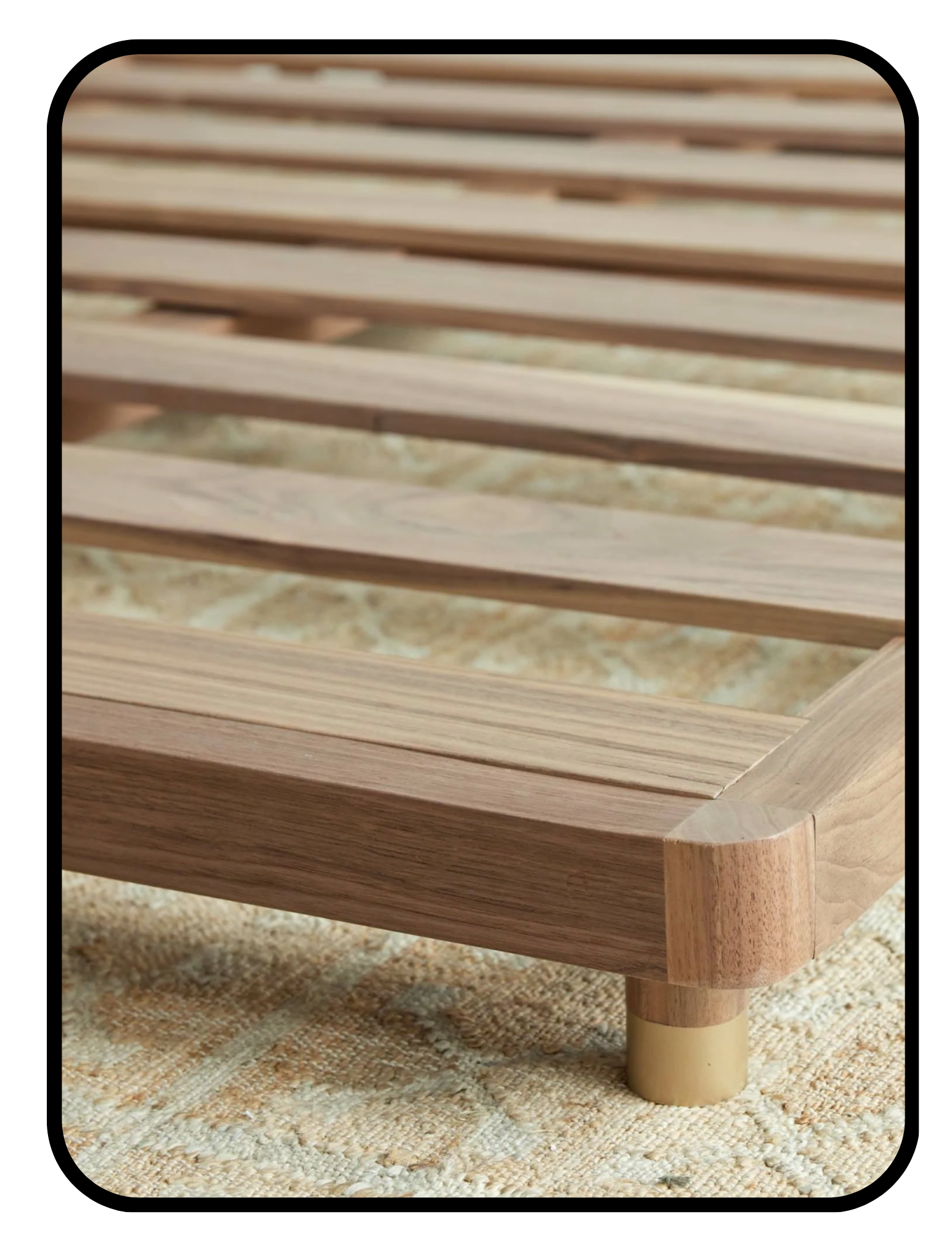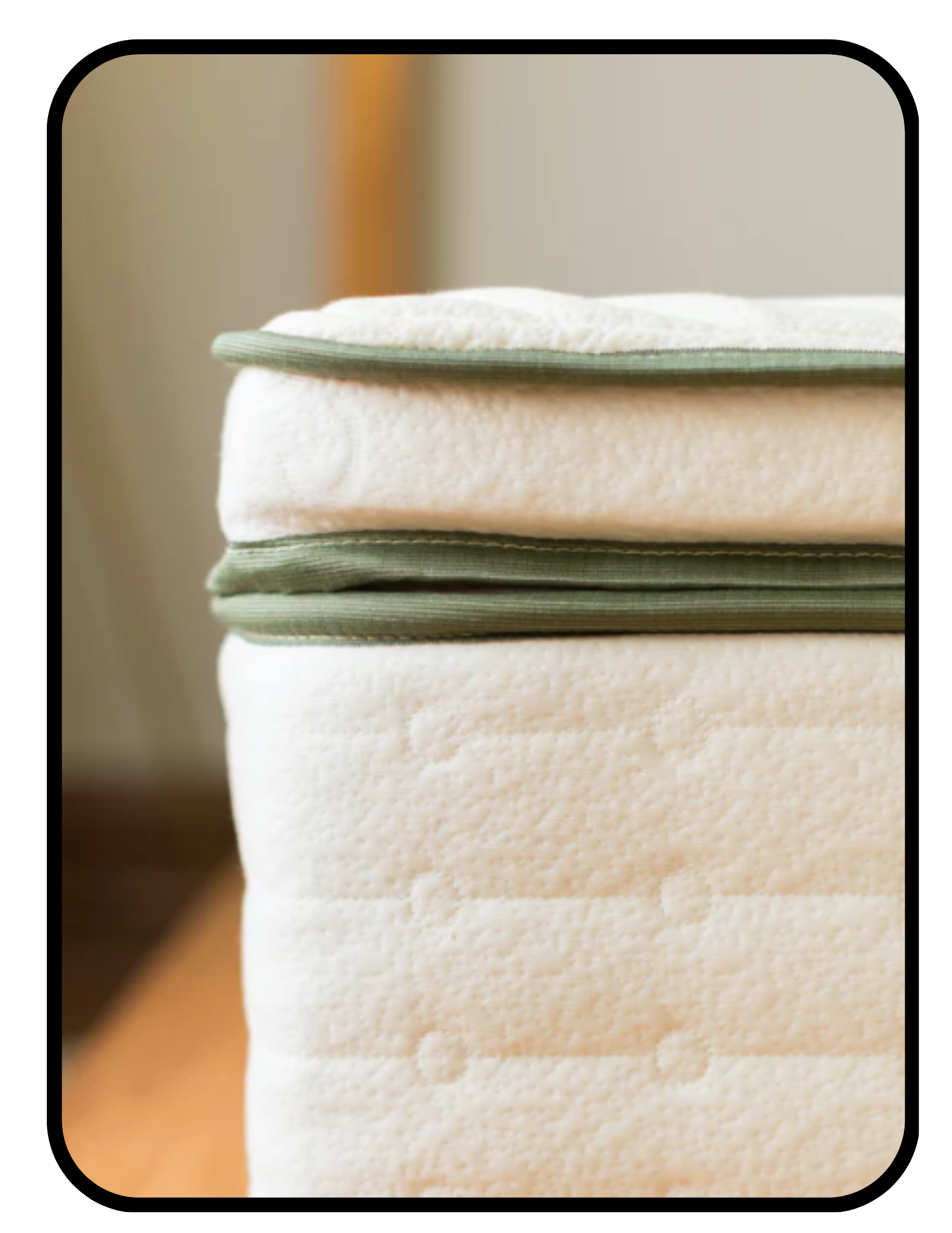Shop by Room ➜ Bedroom ➜ Mattress Protectors
Non Toxic Mattress Protectors
The best organic waterproof mattress protectors, and simple padded fabric ones. Click the rating symbols below each for more information about its material health.
Non-Toxic Waterproof Mattress Protectors
Avocado
Avocado makes a GOTS certified organic cotton waterproof mattress protector made of two layers of cotton sandwiched around an ultra-thin layer of waterproof TPU that is made from cornstarch. FYI, this type of film (TPU) is not the same thing as a polyurethane (PU) foam, and is much safer— read more below. Great on its own or convenient if you’re buying one of their mattresses or toppers at the same time.
Holy Lamb Organics
Wool has a naturally occurring protein called lanolin in it, which is how sheep stay dry and warm even when its raining out. Holy Lamb Organics makes 100% GOTS certified wool waterproof mattress protectors for crib, twin, queen, and king beds that naturally repel liquids, without any added ingredients. These are also thermoregulating, drawing away heat during the summer, and storing it in the winter. The healthiest mattress protectors available. I use one myself!
Naturepedic makes a GOTS certified organic cotton waterproof mattress protector made of two layers of cotton sandwiched around an ultra-thin layer of thermoplastic polyurethane. They don’t disclose what the TPU is made of (proprietary DrySleep technology) but it is reassuring that it meets strict GOTS and MADE SAFE requirements for non-toxicity, and is far better than vinyl.
The most affordable GOTS certified organic waterproof mattress protector. This one is made with waterproof and biodegradable cornstarch based TPU. FYI, this type of film (TPU) is not the same thing as a polyurethane (PU) foam, and is much safer— read more below.
Organic Mattress Pad Protectors
Whisper Organics
Whisper Organics makes 100% GOTS certified organic cotton mattress protectors in every size between Twin and California King. They have this simple cotton option as well as a waterproof option with TPU. This has a small amount of cotton batting, making it mattress pad protector.
Parachute makes a Class 1 OEKO TEX certified mattress protector. It’s filled with 100% cotton padding, as well, making it a bit of a mattress pad rather than just a protector.
Encasement
A little different— but important for allergy sufferers. This six-sided dust mite encasement is the best mattress protector for dust mite allergies because its made of non-woven fabric, meaning the pores between threads are 1 micron or less in size. This detail is super important because 1 micron is smaller than dust mite feces, fragments (and mold spores, too.) Made of polyester, and amazingly has OEKO TEX certification. Zip it around your mattress and consider it permanent. Add a regular protector on top. I have this for my own bed (and pillowcases) and it works wonders for my allergies.
More Healthy Design for You
More About Mattress Protectors
Do you need a mattress protector?
Yes! It protects your mattress— usually quite an investment— from breaking down quickly, as well as from sweat and germs. Mattresses off-gas chemicals more excessively when in contact with body heat, so a protector can also potentially reduce this a small amount.
Are mattress protectors and pads the same thing?
Not quite. While both can protect the mattress from stains, spills, and sweat, mattress pads typically have a small amount of padding sewn in to them. Protectors are typically just the fabric, without padding, and it’s primary purpose is protection only, not comfort.
Do you need a waterproof mattress cover?
If you have young kids, are a heavy sweater, or there are any other possibilities of liquids seeping through your sheets and into your mattress, I recommend a waterproof option to prevent mold, bacteria, and dust mites, all of which thrive in damp, humid places.
What is TPU?
TPU stands for thermoplastic polyurethane, and it is a plastic-based film that is used as a waterproofing fabric in mattress protectors.
How is TPU made?
Like PU (polyurethane, the foam found in mattresses), TPU is also created from two basic building blocks — polyols and diisocyanates (you can watch my 60 second video about what these are and how foam is made here). But, there are a few important differences. First, the two building blocks bond together permanently in a much more predictable and controlled way. Once they’re bonded together (“cured”) , they don’t un-bond. This is less true for polyurethane foam, which has additives to poof it up and soften it, and having uncured ratios of these chemicals can cause some health problems.
Also, new forms of TPU can be biodegradable, made with B. subtilis, a soil-based probiotic bacteria— or can even use cornstarch to replace the petroleum-derived polyols.
Is TPU toxic?
It is very unlikely to harm you, and depends on how it’s made. The “old” way of making TPU involved solvents and off-gassing VOCs. Now, biodegradable and bio-based TPUs are being made, which don’t rely on these, and are much safer for workers.
It’s always better in the long run for human health to shift away from petroleum-based products, which is where polyols and diisocyanates come from— it’s not always feasible to go with the most natural waterproofing solution, wool. But, even an “old” TPU is healthier than vinyl and PFAS, protects you from mold, sweat and bacterial build up in your mattress, and is relatively affordable.
Are there natural waterproof mattress protectors?
Yes. The world of non toxic waterproof fabric can be tricky— traditional options, often made with PVC, are notoriously toxic, and many non-PVC options are made with fabric processing chemicals that can off-gas. Here’s what I recommend:
Choose an organic, washable wool one if you are prioritizing material health above all else. Not only is it completely natural, wool is also very thermoregulating for hot sleepers. See how wool works here.
Choose GOTS certified organic fabric with a super-thin layer of polyurethane film (TPU) in between the layers if you’re sensitive to wool.
Choose an OEKO TEX certified polymer fabric option (like polyester or microfiber) if you’re prioritizing affordability.
What does GOTS certified mean?
GOTS is short for the Global Organic Textile Standard.
It is the gold standard 3rd party certification for organic fabrics made from natural fibers like wool, cotton, linen, and others.
Fabric with the GOTS-certified organic label means that at least 95% of the starting fibers are certified organic, and ensures that the fabric remains healthy throughout the entire manufacturing process. This means the dyes and other chemicals used are safer for human and ecological health than standard fabric processing methods. No harmful finishes may be added to the final product.
What is OEKO TEX?
OEKO TEX certification applies to the finished product only, and is for both natural and synthetic textiles. Organic fibers, as well as man-made fabrics like polyester can both qualify, depending on what chemicals, and how much of them, are left in the final product. It does allow for some harmful chemicals, but in much lower quantities than are used in standard textile processing. You can see their limits, which are updated annually, here.
Shop by Room ➜ Bedroom ➜ Mattress Protectors


















